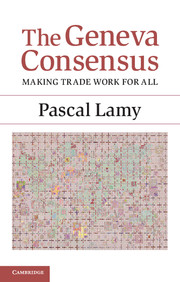Book contents
- Frontmatter
- Contents
- Preface
- 1 Harnessing globalization amid the crisis facing multilateralism
- 2 The changing face of trade
- 3 Helping the poorest up the prosperity ladder
- 4 Trade: friend not foe of the environment
- 5 Trading towards global food security
- 6 Trade can contribute towards better health
- 7 Trade and labour: separated at birth, but still connected
- 8 Trade and energy: the case for a greater WTO role
- 9 Trade and currencies: trading community seeks greater currency stability
- 10 Trade and competition: fairer competition makes for fairer trade
- 11 Trade and human rights: a case of misplaced suspicion
- 12 Corruption: a cancer that trade transparency can help to treat
- 13 Last but not least: the Doha Round
- Epilogue
- Index
12 - Corruption: a cancer that trade transparency can help to treat
Published online by Cambridge University Press: 18 December 2013
- Frontmatter
- Contents
- Preface
- 1 Harnessing globalization amid the crisis facing multilateralism
- 2 The changing face of trade
- 3 Helping the poorest up the prosperity ladder
- 4 Trade: friend not foe of the environment
- 5 Trading towards global food security
- 6 Trade can contribute towards better health
- 7 Trade and labour: separated at birth, but still connected
- 8 Trade and energy: the case for a greater WTO role
- 9 Trade and currencies: trading community seeks greater currency stability
- 10 Trade and competition: fairer competition makes for fairer trade
- 11 Trade and human rights: a case of misplaced suspicion
- 12 Corruption: a cancer that trade transparency can help to treat
- 13 Last but not least: the Doha Round
- Epilogue
- Index
Summary
On a recent visit to Ghana, I was shown a map of trade corridors in West Africa indicating the level of bribes that truck drivers are required to pay and the resulting delays. Compiled by the West African Economic and Monetary Union, with assistance from USAID, the numbers are eloquent: in Burkina Faso, a truck driver pays on average more than US$ 50 in bribes and loses more than 70 minutes every 100 km! Corruption certainly takes its toll on efficiency and on the cost of doing business.
The West Africa Trade Hub initiative was launched in 2006. Trained drivers voluntarily collect data as they load goods from ports in Ghana, the Ivory Coast, Senegal and Togo and transport them to the capitals of landlocked Burkina Faso and Mali. Detailed reports on the extent of corruption and the resulting delays are published quarterly. By increasing transparency, the initiative aims to promote good governance on West Africa’s trade corridors.
Bribery and corruption are of course not limited to certain countries or regions and certainly not to Africa. No country is immune. It is a global issue, and a major concern, not only for victims of corrupt practices, but also for the world at large. According to Gallup’s Global NGO barometer, corruption is widely regarded as a bigger problem than economic issues.
- Type
- Chapter
- Information
- The Geneva ConsensusMaking Trade Work for All, pp. 156 - 163Publisher: Cambridge University PressPrint publication year: 2013



